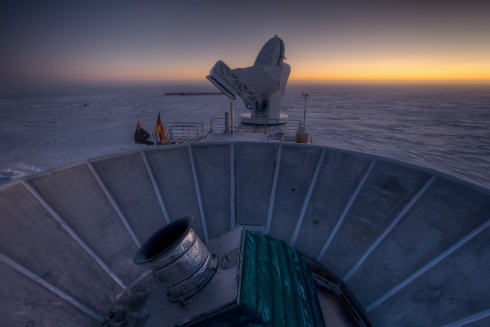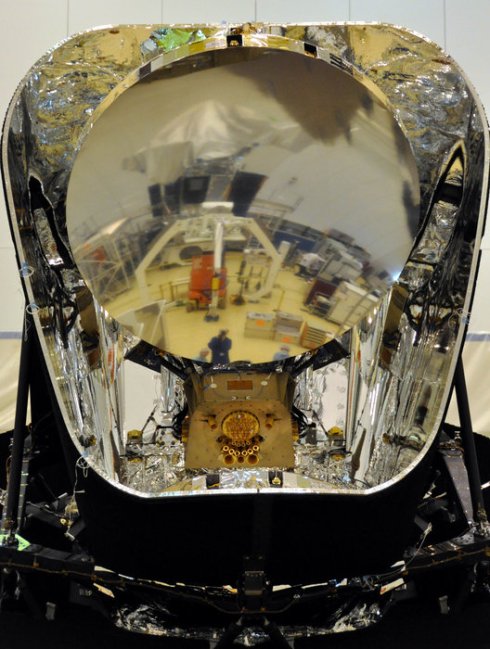Sometimes I feel that it sucks to be a physicist.
(Just to clarify – I am not one, and this is my personal opinion, having worked years in a department full of physicists, and with a background in non-physics fields. This is not after any discussion with other physicists in my dept – they might agree, they might not)
There was a major announcement back in March that results from BICEP2, a telescope sitting in the South Pole, showed evidence of cosmic inflation. This was, at the time, considered a Nobel Prize worthy discovery – I rounded up a few links on this back then.

The sun sets behind BICEP2 (in the foreground) and the South Pole Telescope (in the background). (Steffen Richter, Harvard University)
However, recently new results from Planck, a space telescope run by the European Space Agency, showed that the patterns in cosmic wave background detected by BICEP2 are likely just space dust.
Suddenly the internet space is filled with criticism – like Big Bang blunder bursts the multiverse bubble, or When Science Gets Ahead Of Itself .
Enough, people.
The reason you are seeing all these in the public is because physicists are known to be open about their research results. There is no (or very little) “I am hiding this so that I can get rich off it” or “I think someone else is going to scoop my research.” Data are often shared as soon as they are available via the open access arXiv. People make results open so that others can criticize it. So that the public can better understand science. So the field as a whole can progress as much and as fast as possible. In fact, there was already some talk about data sharing between the BICEP2 and the Planck team. Physicists are years, if not decades, ahead of other fields in the openness and rapidness in sharing information.
In my mind, this is what science is about.
I completely agree with Philip Ball, as he said in his article in the Guardian:
The team involved has been criticised for publishing results before they were peer reviewed. But this is what science is: debate, discussion, deliberation.
This is also what makes science interesting. It is constantly changing, not static; it is the collective knowledge, not lines of facts. As mentioned by Astrophysicist Mario Livio,
As disappointing as these new results may sound, they provide for a powerful demonstration of how science truly progresses. Advances in science are far from being a direct march to the truth. Rather, they consist of a zigzag path that often results in false starts or blind alleys. The important point, however, is that through continuous checks, testable predictions, and new observations, science is able to self-correct and find the right way.
After Higgs Boson was found, Stephen Hawking (who lost $100 in a bet about it) said,
Physics would be ‘more interesting’ if Higgs boson hadn’t been found.
Let’s not go back to the age of waiting for years before the results are published. I say that realizing BICEP2 might come from dusts keeps the discussion of cosmic inflation interesting. And, this definitely means that the bet between Stephen Hawking and Neil Turok is not over yet.
***
Links to the original publications:
Ade P.A.R., M. Amiri, D. Barkats, S. J. Benton, C. A. Bischoff, J. J. Bock, J. A. Brevik, I. Buder, E. Bullock & G. Davis & (2014). BICEP2. II. EXPERIMENT AND THREE-YEAR DATA SET, The Astrophysical Journal, 792 (1) 62. DOI: http://dx.doi.org/10.1088/0004-637x/792/1/62
Ade P.A.R., D. Barkats, S. J. Benton, C. A. Bischoff, J. J. Bock, J. A. Brevik, I. Buder, E. Bullock, C. D. Dowell & L. Duband & (2014). Detection of B-Mode Polarization at Degree Angular Scales by BICEP2, Physical Review Letters, 112 (24) DOI: http://dx.doi.org/10.1103/physrevlett.112.241101
Planck Collaboration, R. Adam, P. A. R. Ade, N. Aghanim, M. Arnaud, J. Aumont, C. Baccigalupi, A. J. Banday, R. B. Barreiro, J. G. Bartlett & N. Bartolo (2014). Planck intermediate results. XXX. The angular power spectrum of
polarized dust emission at intermediate and high Galactic latitudes, arXiv: http://arxiv.org/abs/1409.5738v1

